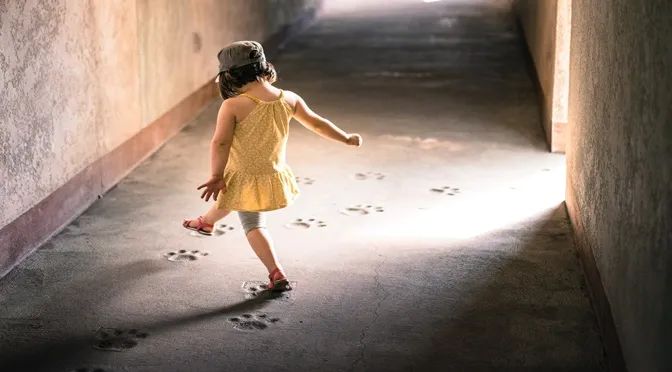
Toddler talk: She's a dance party. I'm a painter.
She’s a dance party. I’m a painter.
When reality and expectations collide,
apply empathy and respect
“What in God’s holy name is that noise?”
That was my first thought as I walked through the door of the little ceramic paint-and-take shop. It sounded like '80s pop played at top speed with Minnie Mouse singing backup. The music didn’t matter, I told myself, because my 3-year-old daughter and I were on a mission to paint! At home, we often spread paper out on our kitchen table and painted for what seemed like hours, and I’d hyped this experience – painting on 3-D figurines with paint that would never wash off – for weeks. We picked out our green-ware, our paints and our brushes, but Maya wouldn’t stay in her seat. She took to the aisle spinning and fists pumping, and rump bumping. The music was more than she could bear, and she had to dance.
The first few reminders to stay in her seat seemed to elicit a halfhearted response, but on number 10, I started feeling like a fool. Maya was the star on a stage of her own, and the music never stopped. On a couple occasions, applause broke out as other customers noticed her joy. I wanted a tenderhearted mommy-daughter painting session that would foster a lifetime of creativity. My toddler wanted a dance party.
I’m an optimist at heart, and looking back, I’ve always had an idyllic vision of my daughter’s childhood, which often sets me up for disappointment. I’m finally starting to learn.
The reality is that when Maya’s behavior doesn’t meet my expectations, it’s not about me. We are two different people with different needs, different opinions, and different interests.
She’s a dance party. I’m a painter.
Later, when I had a chance to stop and reflect, a passage from the book, Gentle Parenting, by L.R. Knost came to mind:
Your child is not a lion to be tamed or a dog to be trained. Your child is a person, an individual with thoughts, interests, concerns, wants and needs that are totally separate from yours. Respecting our children as separate individuals not only models the value we need to place on others in our homes and communities, but also sets the stage for a mutually respectful relationship in the teen years and beyond.
It’s my job as a mother to watch, learn, and shift my expectations to accommodate my daughter’s needs and developmental stages. I’m learning that with a little respect and empathy on my part, she gets what she needs, and I avoid conflict and disappointment.
As I sat with my brush hovering over the ceramic butterfly watching Maya bounce to the beat, it occurred to me that she’d just spent an hour in the car and another hour in a chair at a restaurant. She’d been so good to inhabit such small, quiet spaces for so long, it’s no wonder she was dancing up a dust cloud. I decided that if the manager didn’t object, then I wouldn’t either. Between sets, we managed to splash a bit of paint on the project – enough that my new expectations were met – and on the way out the door I had to ask, “What’s the music?”
“K-pop,” the manager said. And now, we’ve got a Spotify mix for those days when we just gotta dance.
about the author...Laura Bailey is a freelance writer who lives in Red Lodge with her husband, 3-year-old daughter and two fun-loving dogs. They all share adventures in the mountains and on nearby rivers. Find Laura at penandlight.com.
